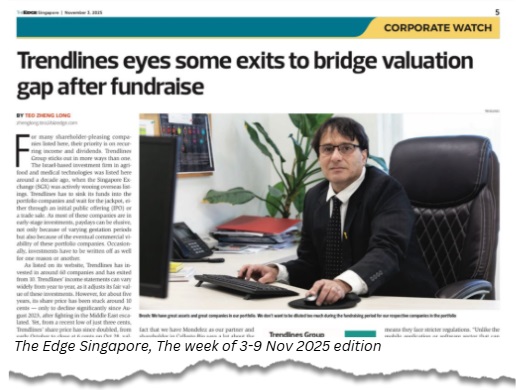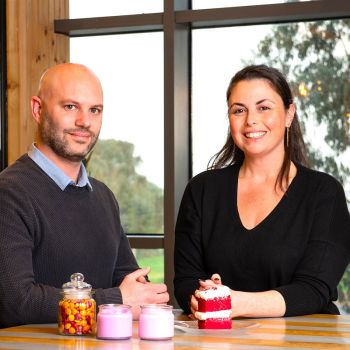A reader contributed this article
| I've been following Trendlines Group closely, and agree that the recent interview published in The Edge Singapore with CEO Haim Brosh and Head of Investor Relations Shira Zimmerman makes a compelling argument that Trendlines is worth very much more than even the recent re-rating of its shares. The shares closed at S$0.06 on October 28—up sharply from S$0.03 in mid-2025 and slightly above the S$0.05 level in January—and the company's market cap has now climbed to about S$84 million (or US$65 million). But there's still a big gap between what the market values Trendlines and what it's really worth.  Trendlines is a SGX-listed, Israel-headquartered powerhouse in agrifood and medtech investments with a robust portfolio of 52 companies. As Brosh explained, targeted exits and spin-offs are being pursued for unlocking value and sustaining growth. Investors currently undervalue the portfolio's fair value. Trendlines gives a US$120.4 million valuation for its portfolio, using a non-IFRS figure. It reflects only last investment round values (ie the implied valuations based on what investors paid for the portfolio companies' shares during placement exercises). It's the number that only looks at the last cheques written, not what these companies could fetch tomorrow if sold. |
Trendlines, known for nurturing early-stage innovations, acknowledges that gestation periods for exits remain unpredictable, influenced by factors like commercial viability.
The firm recently did a S$8 million raise via a rights issue and private placement, in part to invest in the portfolio companies.
"We have great assets and great companies in our portfolio. We don't want to be diluted too much during fundraising for our portfolio companies," Brosh told The Edge.
This fresh capital enables Trendlines to maintain or strengthen stakes in promising ventures, especially as its portfolio firms seek their own funding.
Brosh mentioned 3-4 portfolio companies, without naming them, are ready for prime-time exits which, in my opinion, could possibly begin to take place within the next year.
These potential liquidity events are crucial to bridging the gap between the company's intrinsic value and its market perception.
 Phytolon co-founders: Dr Halim Jubran (CEO), Dr Tal Zeltzer (Chief Technology Officer). Fund-raising: • US$4.1 million in Sept 2020 (seed funding) • US$14.5 million Series A in July 2022 • Additional funding in Oct 2023 • Investment from Rich Products Ventures in Nov 2024 |
It's befitting that the first portfolio company Haim highlighted in The Edge article is Phytolon, a plant-based colorants innovator where Trendlines holds a 20% stake.
As Brosh stated, Phytolon is set to not only redefine the world's food dye industry but also dominate the space.
Phytolon aligns with surging demand for sustainable alternatives.
Compared to other plant-based natural alternatives, Phytolon says it offers higher efficiency: lower water usage by 95%, lower land use by 88%, and lower emissions by 90%.
"I will not quote the value of Phytolon as everyone can conduct their own evaluation and understand as well as I do," Brosh added.
A knowledgeable investor with substantial stakes in 3 listed companies and a growing stake in Trendlines suggested to me that there's no logic Phytolon would be sold for less than the US$940 million acquisition of Oterra in 2021.
Not when we are confident that Phytolon will dominate the food dye industry versus the existing plant-based alternatives.
If that holds, Trendlines could reap over US$206 million from this alone—dwarfing its current US$65 million market cap.
That’s 3X today’s entire market cap—before we even touch the other 2-3 near-term potential exits!
| Similarly, portfolio company Celleste-Bio's recent breakthrough—producing the world's first plant cell-derived cocoa butter—highlights untapped potential in the chocolate supply chain, a massive global industry. Yet, Brosh tempered expectations, noting the technology, while revolutionary, requires time for commercial scaling. "It's a few years away... No doubt that the company is progressing well and possesses the ability to scale up, we prefer to wait for Celleste-Bio to become more mature before we look for an exit for them." Brosh cryptically hinted at a "multiplication of returns" for investors with upcoming exits. To my ears, that’s CEO-speak for “buckle up, this ride’s about to get fun.” |
 → Read the full The Edge article here.
→ Read the full The Edge article here.
→ See also: TRENDLINES: Will this Singapore listco prove to be a good biotech bet as its stock hits bottom?






